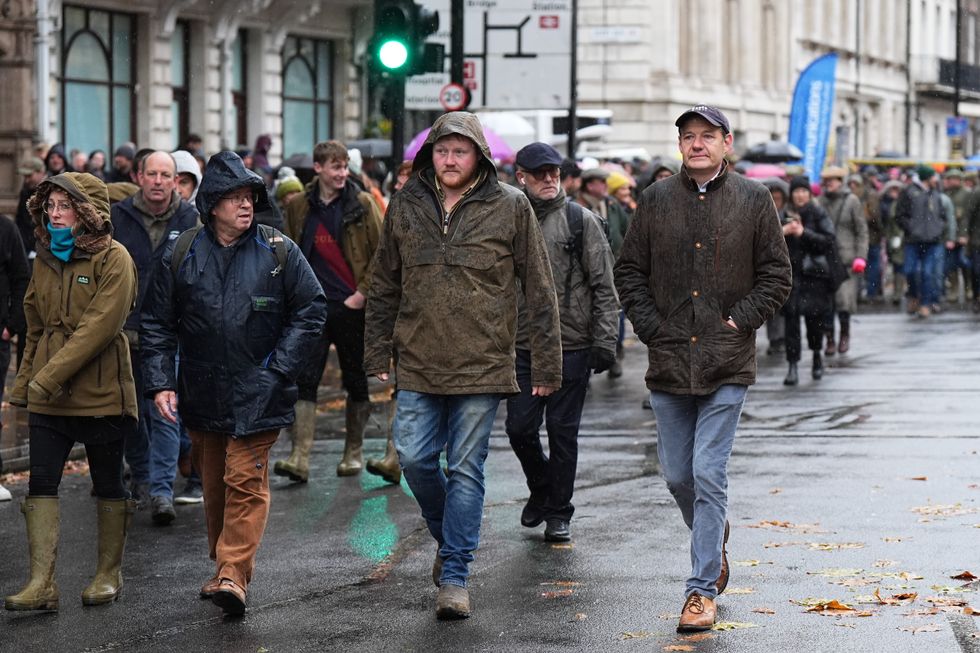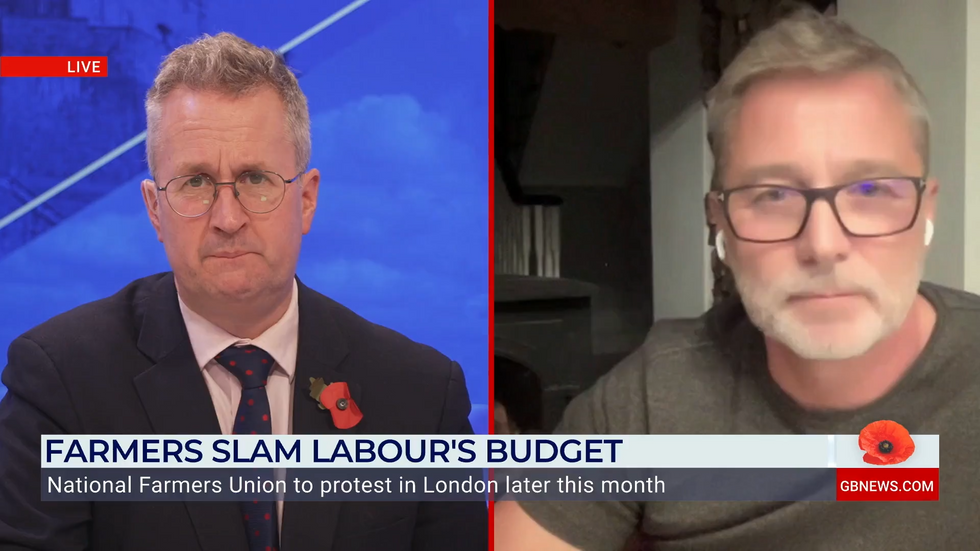Angry farmers take on the government
GB News
Protests on November 19 failed to shift government position
Don't Miss
Most Read
Trending on GB News
Farmers across Britain are planning their next moves to protest Rachel Reeves’ loathed inheritance tax after a peaceful protest in central London failed to shift the government’s position.
Speaking anonymously, one farmer said: “Farmers could bring the country to a halt in 30 minutes; we have got more kit than the army.
“We have got desperate people who have got nothing to lose. There is no limit to what people could do.”
This comes after Chancellor Reeves slapped farmers with 20 per cent death duties on assets over £1million in her latest budget.
The move has caused outrage, particularly amongst asset rich but cash poor family farms who can’t afford the tax bill from farm profit alone.
These farms-perceived as the backbone of British agriculture- would be forced to sell land/machinery to foot the bill, breaking up farms that have been passing through families for generations and worsening the UK’s food security.
 Cooper and fellow Clarkson's Farm stalwart Charlie Ireland attends the farmer's protestPA
Cooper and fellow Clarkson's Farm stalwart Charlie Ireland attends the farmer's protestPAA huge row has ensued over how many farms would be affected with the Treasury claiming it could be as little as 100 per year. Leading agricultural bodies claim it will be far higher, pointing to Defra’s latest stats that show 66 per cent of farms are worth over £1million.
On November 19, the farming community gridlocked central London in protest, but the government doubled down on its position.
Defra Secretary Steve Reed said ‘it was hard to be sorry’ towards farmers for taxing them to fill the Tories’ £22billion black hole and fix the NHS.
Now plots have been circulating online with many farmers in support of ‘French style’ action, namely the blocking of supermarket supply chains.
Farmer Clive Bailye, who organised the November 19 protest, believes it may be the only way to get the government to listen.
The Farming Forum founder said: “I hope it doesn’t come to this and it’s not something I'm going to organise, but I do know that’s what others are planning.
“I don’t think withholding food on farm will work. The only way to create a food shortage is to block supermarkets’ distribution centres.
“You block their distribution centres and take out 1,000 [shops] at a time.
“You can also do that away from roads that make people late for work or miss hospital appointments as they are all nicely out of town in places no one needs to go.
“That keeps public onside, they all hate big supermarkets as much as we do and won’t feel sorry for them at all.”
Not all farmers agree, however. One arable farmer who wanted to remain anonymous advocated more peaceful methods like erecting campaign signs in roadside fields and attending MPs' surgeries.
"Any other bigger protests have to keep the public onside. We are very fortunate to have public support. They are not the target, the government is," they added.
 Clive Bailye admitted that he is 'incredibly sad' about the changes to the inheritance tax put in place by ReevesGB News
Clive Bailye admitted that he is 'incredibly sad' about the changes to the inheritance tax put in place by ReevesGB NewsOne mixed farmer from Yorkshire said: “I'd like to think lobbying will work, but I honestly don't think it will.
“I think the only thing which will work is if Labour see farmers are going to cause issues for the country, which then forces them to give some ground.”
An arable farmer from south Nottinghamshire said he believed empty supermarket shelves was the only way Labour might listen.
He said: “This will get us back in the headlines when no bread is on the shelves.
“I know there are imports available, but they can’t arrange imports so quickly that there wouldn’t be a big noticeable gap on the bread aisles for a period.
“The merchants would have to support us or risk losing our custom for ever.”
Another livestock farmer said: “It feels like we are beyond the point of a well-behaved rally.
“It needs to be a concerted effort from all areas of farming - stopping sludge, holding back lamb and beef, pouring milk away, breaking eggs, stopping veg, grains etc for a week or so.
“I'm not sure blockades with expensive tractors garners the empathy of the public. But the reality of losing farms might.
“However, this can only work with a national lead on this. Someone making a public declaration. We need protests in every county town with all small businesses affected, a nationwide effort.”
LATEST FROM MEMBERSHIP:
GB News put these plans to the British Retail Consortium.
Andrew Opie, Director of Food and Sustainability, said: “Retailers are closely monitoring the impact of the potential interventions, including strikes, but are adept at dealing with disruption and are working hard to ensure customers aren’t impacted.”
This comes after National Farming Union President Tom Bradshaw met Sir Keir Starmer last week for talks.
Mr Bradshaw described the PM as being “in listening mode” and expressed cautious optimism.
“When we talk about the very real human impacts, the viability of family farms, and the low returns from producing the country’s food, these are all conversations we’ve picked up,” he said.
The NFU told GB News details of Bradshaw and Starmer’s conversation would not be made public while they wait to see if anything comes of it.
They stressed they were not part of any further action.
Meanwhile in Europe, French farmers have been staging massive protests at the government’s latest deal with South America’s Mercosur trade bloc which affects agriculture.
Armed police have been deployed to block tractor convoys from penetrating the centre of towns whilst farmers have also blocked roads, dumped manure and occupied town squares.
Responding, a Defra spokesperson said: “Our commitment to farmers remains steadfast – we have committed £5 billion to the farming budget over two years, including more money than ever for sustainable food production, and we are developing a 25-year farming roadmap, focusing on how to make the sector more profitable in the decades to come.
“Our reform to Agricultural and Business Property Relief will impact around 500 estates a year. For these estates, inheritance tax will be at half the rate paid by others, with 10 years to pay the liability back interest free. This is a fair and balanced approach which fixes the public services we all rely on."
Tesco and most other British supermarkets have been approached for comment on the potential for further strikes.
On Wednesday, Rachel Reeves and Keir Starmer are expected to face pressure from rural MPs as Kemi Badenoch’s Conservative Party will use their opposition day to put forward a motion that would cancel controversial changes to agricultural property relief announced at the Budget.
Commentators will be watching closely for signs of nervousness from rural Labour MPs, many who turned their seat red for the first time in generations.







